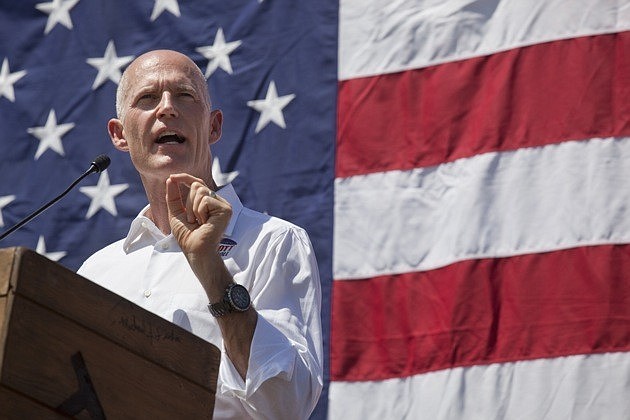- December 25, 2024
-
-
Loading

Loading

Asked to grade his accomplishments in his first legislative session — from “A” for superior to “F” for failing, Florida Gov. Rick Scott knew the answer:
“The right group to judge that is the people of Florida,” Scott said Wednesday afternoon.
But at the end of a 40-minute interview, during which Scott reviewed his campaign promises and legislative agenda compared to what Florida lawmakers adopted or didn't adopt, you would be hard-pressed to argue against the scorecard tilting in his favor.
Remember his repetitive campaign promises? A quick snapshot:
• Lower taxes — check.
Florida's corporate-income tax and water management districts will collect less money next year because of tax cuts — $230 million.
• Less regulation — check.
Two red-tape-laden departments — Community Affairs and Environmental Protection — have undergone partial castrations, and the state development review process has been lessened for local projects.
• Increased government accountability — check.
Teachers' performance will be measured against student performance, and those teachers who don't measure up, well, it'll be far easier than before to fire the underperformers.
• Jobs, jobs, jobs — check.
Since Scott took office in January, Florida's employment has increased by 59,000 new jobs while the unemployment rate has fallen from 11.5% to 10.6%. You can't credit Scott with creating those jobs; government doesn't create jobs. But Scott still wants Florida voters to measure him against his promise — 700,000 new jobs in seven years.
Altogether, when Scott assessed his administration's first legislative session compared to what he proposed in his budget and State of the State address, the governor said: “Clearly we have started the process of reducing taxes and regulation. We made significant progress for making our state No. 1 for business.”
Put another way, if you were looking at a meter, the Republican-dominated Legislature moved the needle to the right. “The principles of lower taxes and less regulation are in the budget all in a manner that will get jobs going,” Scott said.
The evidence of Scott's agenda moving through the Legislature is in the accompanying box.
To be sure, however, Scott's most vocal critics (the Tallahassee press corps and daily newspaper editorial writers) will crow — indeed they already have — that Scott wasn't all that successful. He did not get the $5 billion in cuts from the state budget or the $2 billion in tax cuts he proposed. The governor was aiming for the latter by eliminating the state's 5.5% corporate income tax and the state-required portion of school property taxes.
But being the business dealmaker that he was in the private sector, Scott said he knew that a complete adoption of his agenda would have been too optimistic and unrealistic.
“It's no different than when I was negotiating as a CEO,” he said. “I know where I like to be, and I explain as best I can why I like to get there. I'm also realistic.”
He knows it's a process. “My goal was to phase out the corporate income tax over seven years; that's been my plan all along,” Scott said. “Don't forget, this year we had to deal with a $4 billion deficit. My focus was to start the process. I know we still have a lot of work to do.”
Scott said he is not going to waver from his agenda. “My job every day is to improve, and ask: 'How do we get better?'” he said. “I'm going down the exact same path (next session) and follow the principles I believe in and talk to the legislators why I believe them.”
Asked what he learned about dealing with the Legislature, Scott said the lawmakers didn't surprise him. The lobbyists did. “There are so many special interests. It's unbelievable. That was my biggest surprise,” Scott said.
And with his first legislative session now complete, asked his view of whether government can be run like a business, Scott said: “Businesses are supposed to focus on customers and constantly measure and improve. Government should do the exact same thing. You absolutely should run government like a successful business. If you do, everyone will get better service for the dollars spent.”
When Scott delivered his State of the State address in early March, he challenged lawmakers to deliver bold action. Pressed to grade lawmakers on a scale of “bold,” “status quo” or “more mush from the wimps,” Scott said:
“They did very well. We made big progress. We are positioning Florida as the state in which to do business.”
Click here to see Scott's scorecard.